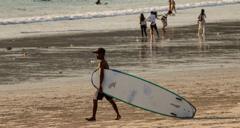Is the Bali-fication of Our Laidback Surf Island Killing Its Charm?

Published: 2025-10-18 23:00:18 | Category: world
Lombok, an Indonesian island known for its stunning beaches and natural beauty, is undergoing rapid transformation as it seeks to become a prominent tourist destination, reminiscent of Bali. Local residents, however, grapple with the consequences of this development, balancing economic opportunities with cultural and environmental concerns.
Last updated: 06 October 2023 (BST)
Key Takeaways
- Lombok is being developed as a major tourist destination to alleviate pressure on Bali.
- Local residents face eviction and cultural changes due to government-led tourism projects.
- Despite economic opportunities, many locals are concerned about losing their cultural identity and natural beauty.
- Recent tourist arrivals to Lombok have surged, indicating growing interest in the island.
- The environmental impact of tourism is raising alarms among residents and environmentalists alike.
The Allure of Lombok: A Hidden Gem
Situated just east of Bali, Lombok is often described as an "untouched" paradise, boasting beautiful beaches and breathtaking landscapes. While Bali has long been a staple in the Indonesian tourism industry, Lombok offers a quieter alternative, appealing to those seeking serenity away from crowded tourist hotspots. However, with the Indonesian government aiming to replicate Bali's success, Lombok is at a crossroads.
The Push for Development
The Indonesian government has recognised the potential of Lombok as a lucrative tourist destination. The plan, often referred to as "Balification," seeks to attract more visitors by developing areas like Mandalika into tourist-friendly hubs. This includes the construction of luxury resorts, restaurants, and entertainment facilities, all intended to boost the local economy.
Changes in Mandalika
Mandalika has been identified as the centre of Lombok's transformation. The area has seen the rise of upscale resorts and even a motorcycle Grand Prix, which attracted nearly 150,000 spectators earlier this month. The investment in infrastructure, including a $250 million loan from the Asian Infrastructure Investment Bank, is aimed at enhancing Lombok's appeal.
Impact on Local Communities
While the development offers potential economic benefits, it comes with significant costs for local residents. Many families have faced eviction from their homes to make way for new construction. Damar, a local surf guide, shared his experience of being uprooted, highlighting the anger and helplessness felt by those affected. Although he has managed to rebuild his life, many of his neighbours remain in precarious situations, unable to secure alternative housing.
Activism and Resistance
Local activists have raised concerns over the government's approach to development, labelling it as a violation of human rights. Reports indicate that over 2,000 people lost their livelihoods due to evictions linked to tourism projects. The UN human rights experts have also expressed alarm, stating that many displaced residents were given inadequate notice and no proper resettlement plans.
Cultural Changes and Identity Struggles
Lombok's predominantly Muslim population and the indigenous Sasak culture are also facing challenges as the island embraces tourism. Traditional values may be overshadowed by the influx of tourists expecting a Bali-like experience. Local sentiment echoes a desire to maintain their unique cultural identity, with some residents concerned that increasing commercialisation could lead to a loss of authenticity.
Tourist Perspectives
Visitors to Lombok are divided on the changes. Some, like Swiss tourist Basil Berger, appreciate the island's natural beauty and cultural uniqueness, fearing that Lombok is at risk of losing its charm through overdevelopment. This sentiment is shared by many who value what makes Lombok distinct from its more famous neighbour.
Environmental Concerns
The environmental impact of rapid tourism development cannot be ignored. Events such as the motorcycle Grand Prix have resulted in significant littering, raising questions about Lombok's capacity to manage increased tourist traffic sustainably. Residents are calling for responsible tourism practices that protect the island's natural resources while promoting economic growth.
Balancing Development and Sustainability
As Lombok navigates its transformation, the challenge lies in finding a balance between development and preserving the island's environment and cultural heritage. Stakeholders must consider how to foster economic growth without compromising the very attributes that make Lombok appealing to both tourists and locals.
Entrepreneurship and Economic Opportunities
Despite the challenges, tourism has opened new avenues for entrepreneurship. Many locals have started businesses catering to visitors, from surf schools to homestays. Baiq Enida Kinang Lare, a homestay owner known as Lara, has expanded her business significantly since entering the tourism sector. Her success story reflects the potential for locals to thrive in a changing economy.
Community Development Initiatives
Efforts are underway to ensure that the benefits of tourism extend to local communities. Foreign investors like Andrew Irwin, co-owner of LMBK Surf House, express a commitment to uplifting local employees and fostering sustainable practices. However, concerns remain about whether these initiatives will genuinely benefit those most affected by the changes.
Looking Ahead: What’s Next for Lombok?
The future of Lombok hinges on how it manages the dual pressures of tourism development and cultural preservation. As more tourists discover the island, the government and local stakeholders must prioritise sustainable practices that protect both the environment and the cultural landscape. The challenge is to create a thriving tourism economy without sacrificing the very essence of Lombok.
Conclusion
As Lombok embarks on its journey to become a premier tourist destination, the balance between development and preservation will be crucial. The island's unique charm, cultural identity, and natural beauty are at stake. How Lombok navigates this transformation could serve as a model for other regions facing similar challenges in the future.
FAQs
What is "Balification" in the context of Lombok?
"Balification" refers to the Indonesian government's initiative to develop Lombok into a major tourist destination similar to Bali, aiming to replicate its success in attracting visitors.
How has Lombok's tourism changed in recent years?
Tourism in Lombok has surged, with a 40% increase in foreign tourist arrivals last year, highlighting growing interest in the island as an alternative to Bali.
What concerns do locals have about tourism development in Lombok?
Many locals are concerned about evictions, loss of cultural identity, environmental degradation, and whether the economic benefits of tourism are equitably distributed.
What impact has the motorcycle Grand Prix had on Lombok?
The motorcycle Grand Prix attracted significant crowds but also raised concerns about litter and environmental management, reflecting the challenges of managing large-scale events in a developing tourism sector.
How can Lombok balance tourism and cultural preservation?
Lombok can balance tourism and cultural preservation by implementing sustainable practices, involving local communities in decision-making, and ensuring that development benefits residents while protecting the island's unique identity.



